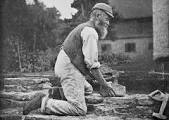My life is the poem I could have writ,
But I could not both live and utter it
~Henry David Thoreau
The common man goes to an orchard to taste the fruit. The rich man man learns how to plant his own orchard. The poet, however, grows an even better fruit and gives it all away; for in its perfection no person could afford to buy these apples that never bruise or fall or wilt in the heat. It is an apple that gives more than sustenance—it is an apple that gives life itself. For the true poet, his or her life is the vessel of humanity, and in their words they carry the collective dreams, haunts, wonderings, visions, and perceptions that lifts any who read or hear out of the muck of existence and into a more transcendent experience—an uncommon experience of common life.
Educators, psychologists, social scientists, and pundits love to decry the scourge of illiteracy by assuming that simply knowing how to form vowels into sounds and words and reading them implies “literacy,” even if knowing how to read has little in common with being a “literate” person. A literate person simply appreciates the power of words shared between hearts, and souls, and minds. The insights of one truly thoughtful person outweighs the benefits of a reading a pile of supercilious and self-aggrandizing opinion pieces or trolling through the detritus of a hundred shallow websites. I have met a good many people who do not avidly read but whom I still consider to be very literate; for to be literate, you have to be thoughtful and reflective enough to question, churn, mull, and distill your own subtle thoughts towards a universal clarity and to create something out of that insight. For there to be true literacy, there has to be discernment, discipline, and doggedness. For the wise but unread sages of the past—and to a lesser degree—the present their lives were and are the creation or legacy left behind to inspire, inform, and enlighten. Neither Jesus, or Buddha, or Black Elk, or Mohamed set out to “write a book.” Each of them simply lived their lives in concert with the wisdom of their thoughts. To think that reading literature is the only gateway to wisdom and understanding is utter classist deceit and intellectual arrogance. It is thoughts put into words and actions that defines literacy.
One of the perils of age is to know something that should be learned, but it can’t be taught; it can only be experienced, and it is something you either do or you don’t, but you are, to coin a new word, the “experiencer.” By hook or crook, I am going to give you the opportunity to experience a literate lifestyle—meaning you are reader, writer, listener, watcher, thinker, philosopher, poet, raconteur, creator, and creation. I say creation because first, you need to recreate yourself—some of you more than others—and take conscious and concrete steps to live and embrace a literate life, willingly. It is a life that implicitly accepts that well-crafted words have a power to lift us out of the “mean and moiling” life that so exasperated Thoreau, and so limits the possibilities and options that life presents. For you it needs to be more than poetry and classics dropped on you through my myopic vision.
You all are living at the edge of the brave new world hinted at by an erudite and visionary few a mere generation ago. The irony is that the technology that unshackled your generation and literally opened wide the doors of learning for anyone who remotely gives a damn has also sucked in the weak and timid sycophants amongst us into a stagnant, vapid, and self-centered lifestyle whose only reflective moments in life are in front of a bathroom mirror or in the brief moments between loadings of a new Call of Duty game.
Here are some things you can do to lead a more literate and fruitful life
- Daily Journal Writing: write every day or you will not grow as a writer. Occasionally, some pretty amazing seeds are planted in an an innocuous journal entry.
- Reading, watching, and listening to better yourself and your appreciation for the power of words. Don’ t just watch TV or movies to veg out and escape (though sometimes that is just what we need); rather watch a movie that is thought-provoking; read a book that endures for a reason, or read a book that someone recommends to you for a reason. Read the op-Ed editions of the paper; go to websites that encourage mindfulness more than mindless consumption. Listen to music in a different way.
- Learn and practice the skills of good writers: For us it will be: narrative paragraphs; life reflections; literary reflections, short stories and poetry.
- Take the time to think and create: If you don’t have time, make time. Find a way to create thoughtful times. Sit quietly, take solitary walks, and always spend the needed time to write about what you think.
- Gather where thoughtful people gather. Make yourself a more active part of our writing community. Write really cool pieces for The Fenn Voice. Seek out other blogs that appeal to your artistic sensibilities. Watch Ted Talks, history channels, nature channels—anything that fills you rather than drains you.
Your life is an orchard of endless opportunity. There is so much you can everyday do to prepare the soil and tend to the plantings. The truest harvest is the words you reap, the life you lead, and the wisdom you share.


